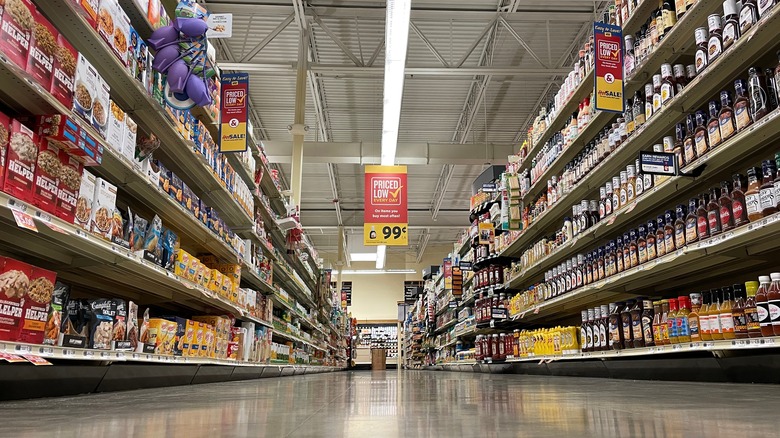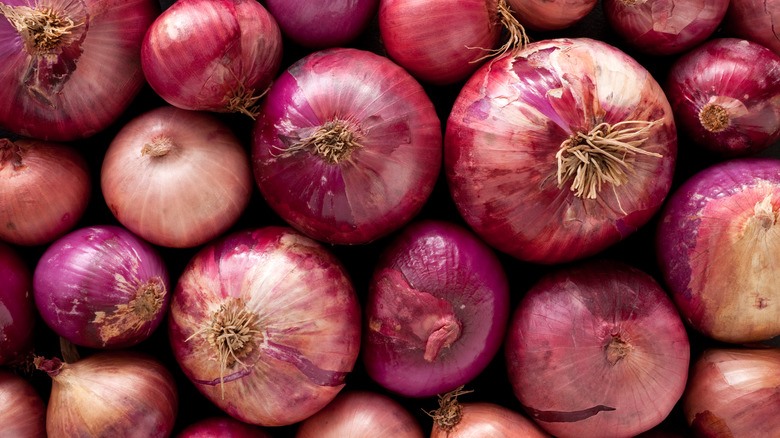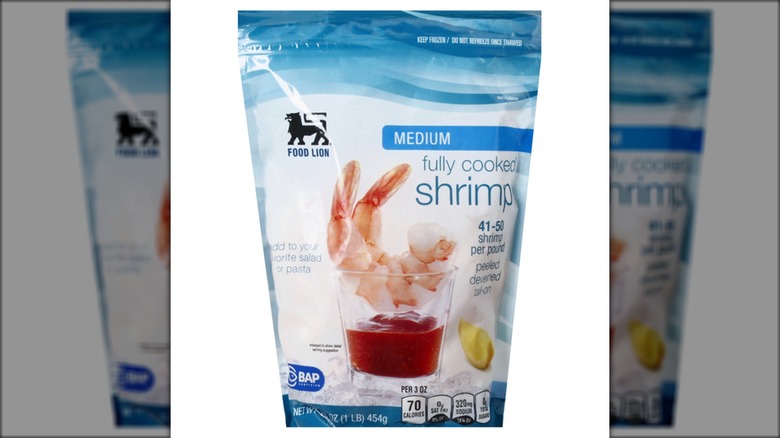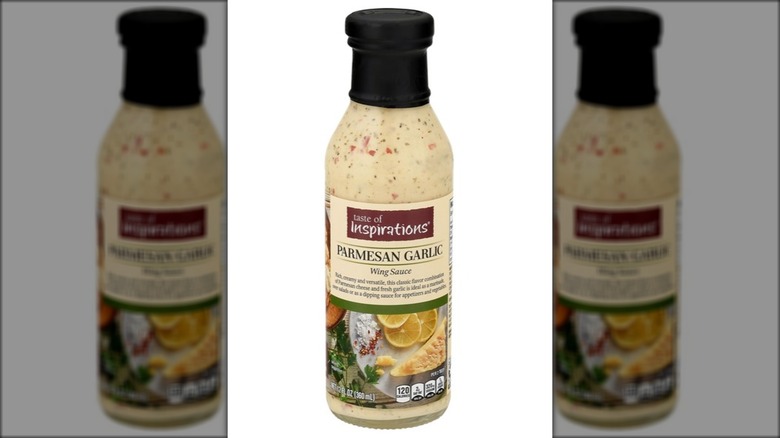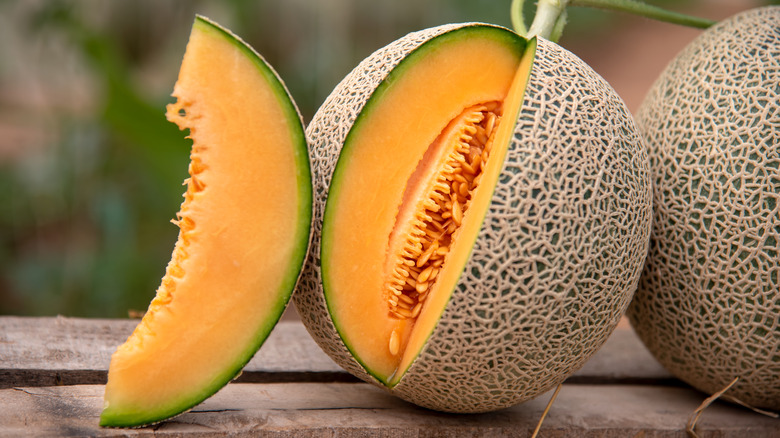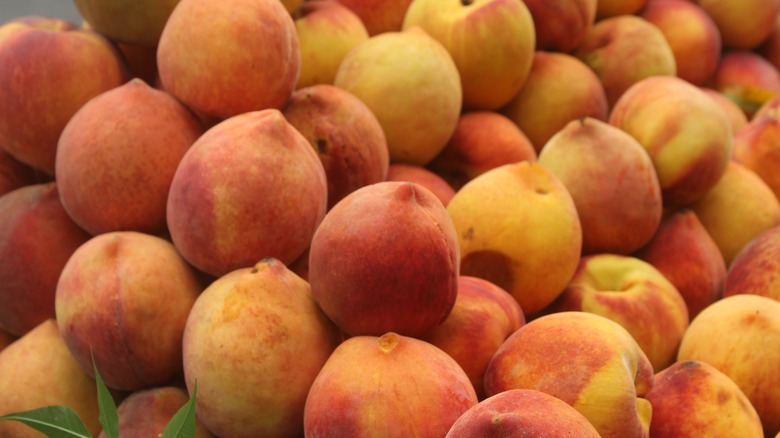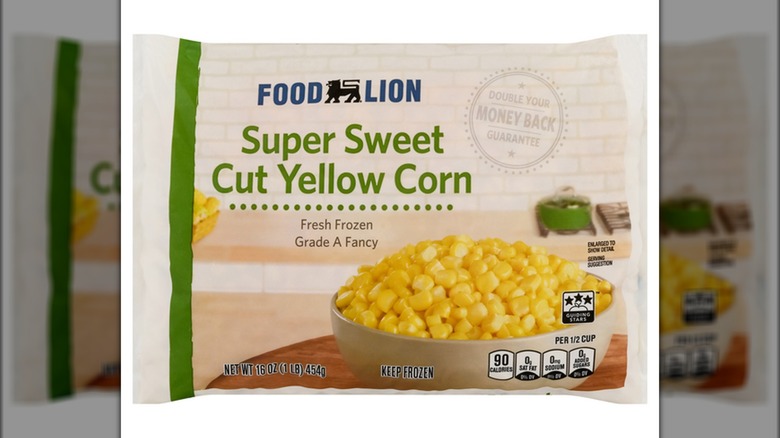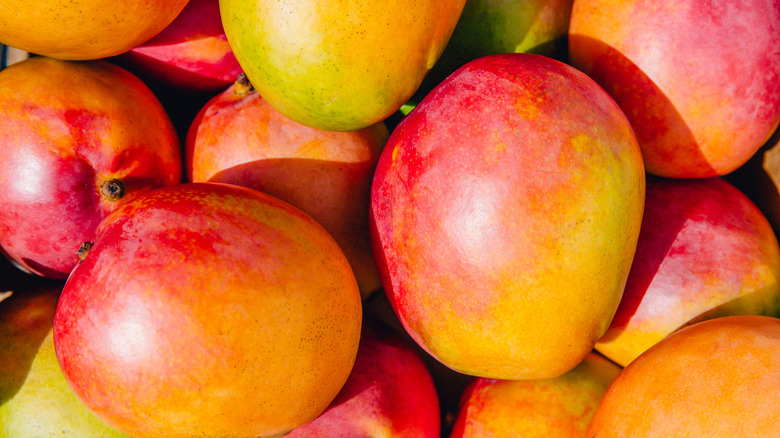9 Recalls That Will Always Haunt Food Lion
Although it's not always celebrated for the quality of its fresh produce, Food Lion is a successful regional grocery store chain that has more than 1,000 stores spread over 10 states. With each of these stores stocking tens of thousands of products, it's understandable that Food Lion has recalled an array of items over the years. In fact, the same could be said of just about every other grocery store chain, with companies as well-established as Aldi issuing a slew of haunting food recalls in recent years. Still, it's worth taking a closer look at Food Lion's recalls — especially since the worst have lingered in customers' minds.
Food products are recalled for any number of reasons. These include them being contaminated with potentially harmful bacteria, containing undeclared allergens, or peppered with foreign objects. While the cause of the recall is often due to a manufacturer's error or oversight, how effective the recall proves to be is usually down to the retailer. Stores must rapidly remove the tainted items from the shelves while also getting into contact with those who might have already purchased them. Fail to act quickly enough and the impact of a faulty product only grows. For the most part, Food Lion has executed its recalls well. However, the grocery store chain's swift actions have not always been enough to prevent injury, illnesses, or worse from occurring.
1. Onions recalled due to massive salmonella outbreak
On August 1, 2020, Thomas International Inc. issued a recall of four different types of onions — red, yellow, sweet, and white — over fears they had been contaminated with salmonella bacteria. If ingested, these bacteria cause an illness known as salmonellosis with symptoms including fever and stomach cramps. Although most cases of salmonella come from milk, eggs, poultry, and beef, this outbreak proved that vegetables can pose just as much of a risk.
The contaminated onions were distributed to restaurants, grocery stores, and other food companies in each of America's 50 states, including multiple Food Lion stores, from the beginning of May onward. This meant that, despite Food Lion and every other affected business executing swift recalls, a total of 1,127 people still fell ill due to the contaminated produce. Of this total, 167 people were hospitalized. Fortunately, there were no deaths associated with this salmonella outbreak. An investigation revealed that Thomas International Inc.'s red onions were the source of contamination.
It is impossible to know how many, if any, of the individuals who fell ill bought the contaminated produce from Food Lion. Regardless, an association with an outbreak of this magnitude is not something that a grocery store, or its customers, readily forget.
2. Bottled water recalled over E. coli concerns
Of all the products stocked by grocery stores, few people would expect bottled water to become the center of a recall. However, this is exactly what happened when Food Lion and many other retailers, including Wegmans and 7-Eleven, were forced to pull bottled water from shelves in June 2015. The company that produced this water, Niagara Bottled Water, initiated the recall when it discovered that one of the springs it sourced its water from had become contaminated with strains of E. coli bacteria.
E. coli is a bacteria that is found in the digestive tract of humans and animals. These harmful strains cause serious bouts of food poisoning with symptoms including diarrhea, vomiting, and fever. Some individuals may even develop a life-threatening type of kidney disease known as haemolytic uraemic syndrome. For this reason, potential outbreaks are taken extremely seriously by all parties.
Food Lion reacted to the recall by removing the bottled water from stores in five states: Delaware, Maryland, Pennsylvania, Virginia, and West Virginia. The recall was successfully executed, thanks in no small part to the swift action of Food Lion and other retailers. No illnesses or injuries were linked to the potentially contaminated products.
3. Cheese recalled due to listeria outbreak
In September 2022, Old Europe Cheese announced a mass recall for its brie and camembert soft cheese products after it was discovered they had been contaminated with listeria monocytogenes. This bacteria poses an especially large risk to pregnant people, as listeriosis, the illness that listeria bacteria causes, often leads to pregnancy complications and in some circumstances miscarriage. This is why pregnant people are often advised not to eat soft cheese at all. A severe illness, listeriosis can also lead to fever, convulsions, and even death.
As a major supplier, Old Europe Cheese's products were stocked by grocery store brands across the country. These included Food Lion, Lidl, Meijer, and Whole Foods, a store known for its impressive selection of cheese. In Food Lion's case, a single product — Taste of Inspirations Double Creme Brie Cheese Wedge — was recalled from every single one of the brand's stores. Unfortunately, the measures taken by Food Lion and other retailers could not prevent six people from falling ill with listeriosis, five of whom were hospitalized.
4. Cooked shrimp recalled due to salmonella
Several of the bacteria which cause food borne illnesses, including salmonella, E. coli, and listeria, are killed at high temperatures. This means that even contaminated raw food can become safe to eat during the cooking process. However, pre-cooked foods do not have this extra safety net as many people consume them without sufficiently reheating them. This means that contaminated pre-cooked foods have the potential to cause serious food poisoning outbreaks, as was the case in June 2021 when Avanti Frozen Foods issued a recall for its frozen, pre-cooked shrimp.
According to the Food and Drug Administration, the contamination was discovered during part of the FDA's routine inspection process. The affected grocery store brands were contacted and recalls were issued. Food Lion recalled its 16-ounce packets of cooked shrimp from every one of its stores. Unfortunately, the contaminated shrimp still sickened at least nine people with three of them requiring hospitalization.
5. Wing sauce recalled because of undeclared allergen
Approximately 0.4% of the United States' adult population has an allergy to finned fish. While not overly common, this allergy is linked with high instances of anaphylaxis meaning that, for those with the allergy, accidentally eating fish can have dire, and even fatal, consequences. This made a 2021 recall issued by Food Lion over an undeclared fish allergen all the more alarming.
Food Lion recalled its Taste of Inspirations Parmesan Garlic Chicken Wing Sauce in March 2021 after it realized that fish, which is included in the sauce, was not listed as an allergen on the product's nutrition label. This meant that those with finned fish allergies were at risk. Luckily, there were no reports of illnesses or allergic reactions occurring as a result of this mislabeled product, although those who suffer from allergies surely had their trust in Food Lion knocked by such a glaring oversight.
6. Cantaloupes recalled due to listeria contamination
As we've seen, grocery stores such as Food Lion can only act if and when recalls are issued by food safety authorities or suppliers. This constantly leaves them playing catch-up, a fact that was on full display in summer 2012 when Burch Equipment LLC issued a recall for cantaloupes that were thought to be contaminated with listeria monocytogenes bacteria.
Initially, the company issued a recall for Athena cantaloupes. These were not stocked by Food Lion so the grocery store chain did not act. However, it soon came to light that this information was incorrect; the affected variety was not Athena but Caribbean Gold, a variety that Food Lion did indeed stock. None of the rigmarole was Food Lion's fault, however, it left the store at the center of a massive snafu.
Food Lion subsequently pulled the Caribbean Gold cantaloupes from 463 of its stores, over half of which were located in North Carolina. Despite Food Lion and other retailers' recalls being hampered by misinformation, no illnesses or injuries were linked with the contaminated cantaloupes, a lucky escape for supplier and retailer alike.
7. Peaches recalled after salmonella outbreak
As a food group that is usually eaten raw, fruit poses a high risk of causing foodborne illness outbreaks. This was exactly what happened in the summer of 2020 when peaches that had been contaminated with salmonella caused over 100 people to fall ill across 17 states. The peaches were sold across the United States in stores such as Food Lion, Walmart, Target, and Aldi. An investigation by the Food and Drug Administration concluded that the contamination likely occurred during the growing, harvesting or storage phase prior to the peaches being distributed.
After the recall was issued, Food Lion pulled both yellow and white peaches from its stores. Unfortunately, the actions of Food Lion and other retailers could not prevent many people from falling ill; 28 individuals ended up in the hospital after consuming the contaminated peaches, marking this outbreak as a very dark day for all the affected retailers, Food Lion included.
8. Frozen vegetables recalled over listeria contamination
Food Lion had to address yet another potential listeria monocytogenes outbreak in August 2023 when Twin City Foods Inc. announced that some of its individually quick frozen vegetables might have been contaminated with the bacteria. Both Kroger and Food Lion were impacted by this news. Food Lion had to recall two products: Food Lion Super Sweet Cut Corn and Food Lion Mixed Vegetables. Food Lion encouraged those who had purchased the products between November 7, 2022 and August 19, 2023 to return them for a refund that was worth double the product's price.
Fortunately, there were no reports of injury or illness associated with this recall. However, the consistent rate of food recalls conducted by Food Lion, and the fact that most pertain to bacterial contamination, will surely have some customers wondering whether the food safety procedures being followed by the grocery store chain's suppliers are up to scratch.
9. Mangoes recalled after over 100 sickened by salmonella
In 2012, the Centers for Disease Control and Prevention investigated a nationwide salmonella outbreak that was linked to mangoes. Exactly 127 people were reported as falling ill due to consuming the contaminated fruit with 33 of them requiring hospitalization. People from 15 different states were affected. Food Lion was notified at the end of August that products it stocked were included in this recall. The grocery store brand subsequently pulled both Daniella mangoes and a packaged product, Garden Highway Mango Medley, from its shelves.
Although Food Lion was notified late, its recall was a successful one. Far fewer people fell ill in the mid-Atlantic and southeastern states than those located on the United States' west coast. However, for those that did fall ill, this fact is of little comfort. Ultimately, this stands as another massive foodborne illness outbreak that Food Lion was a part of.
